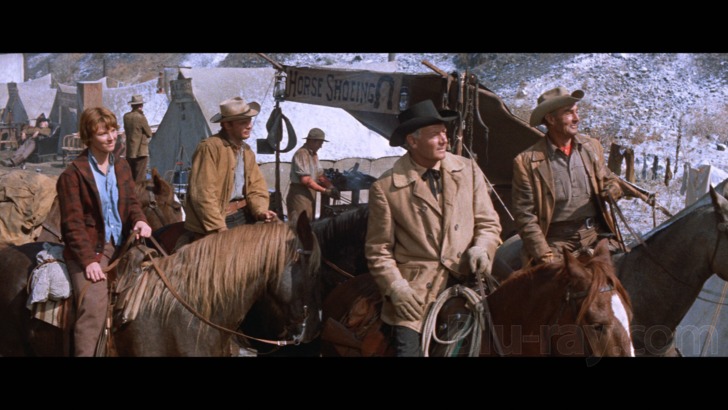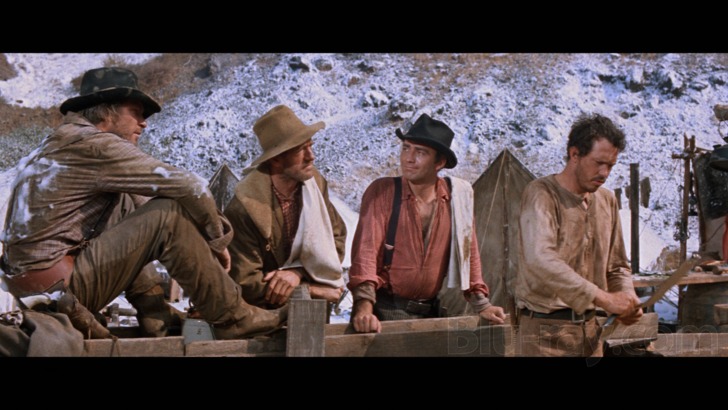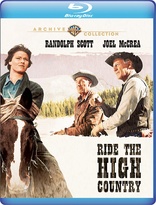Ride the High Country Blu-ray Movie
HomeRide the High Country Blu-ray Movie 
Warner Archive CollectionWarner Bros. | 1962 | 94 min | Not rated | Apr 04, 2017
Movie rating
7.6 | / 10 |
Blu-ray rating
| Users | 5.0 | |
| Reviewer | 4.5 | |
| Overall | 4.5 |
Overview
Ride the High Country (1962)
An ex-lawman is hired to transport gold from a mining community through dangerous territory. But what he doesn't realize is that his partner and old friend is plotting to double-cross him.
Starring: Randolph Scott (I), Joel McCrea, Mariette Hartley, Ron Starr, Edgar BuchananDirector: Sam Peckinpah
| Western | Uncertain |
| Drama | Uncertain |
| Adventure | Uncertain |
| Romance | Uncertain |
Specifications
Video
Video codec: MPEG-4 AVC
Video resolution: 1080p
Aspect ratio: 2.40:1
Original aspect ratio: 2.35:1
Audio
English: DTS-HD Master Audio 2.0 Mono (48kHz, 24-bit)
Subtitles
English SDH
Discs
Blu-ray Disc
Single disc (1 BD)
Playback
Region A, B (C untested)
Review
Rating summary
| Movie | 4.0 | |
| Video | 5.0 | |
| Audio | 4.0 | |
| Extras | 3.0 | |
| Overall | 4.5 |
Ride the High Country Blu-ray Movie Review
Peckinpah Begins
Reviewed by Michael Reuben April 6, 2017Writer/director Sam Peckinpah was making revisionist Westerns before anyone coined the term.
An early example is Ride the High Country ("RtHC"), the director's second feature film, which
teamed aging stars Joel McCrea and Randolph Scott, two of the screen's most durable and
beloved cowboys. Under Peckinpah's direction, and with his uncredited rewrite of an already
retooled script by alcoholic screenwriter N.B. Stone Jr. (Man
with the Gun), the film morphed
into something other than the throwaway bottom half of a double bill that MGM trickled into
theaters in the summer of 1962. As critics and film festivals realized, Peckinpah had created an
enduring classic of the genre, an elegy for an Old West that may never have existed outside the
hearts of idealists like McCrea's Steve Judd, the former lawman who accepts a hazardous job
because he's down on his luck, and Scott's Gil Westrum, Judd's former comrade who joins him
with ulterior motives.
With stylish cinematography by Lucien Ballard, who would go on to shoot four more films with
Peckinpah, including The Wild Bunch,
RtHC is the latest catalog gem to be remastered by the
Warner Archive Collection, which is bringing this essential Western to Blu-ray in a fresh
presentation that allows contemporary viewers to experience Peckinpah's evocation of a dying
era with new immediacy.

RtHC is dominated by one of those pairings of opposites—who aren't really opposite—that are a hallmark of Peckinpah's films and of which the most famous are Pike Bishop and his former partner and now pursuer, Deke Thornton, in The Wild Bunch. Here, the opposites are Steve Judd (McCrea), an aging lawman whose clothing is frayed because he can barely find work, and Gil Westrum (Scott), a former cohort of Judd's who now scams patrons in a sideshow, where he disguises his face behind a false beard, a visual metaphor for his hidden agenda. The erstwhile colleagues reconnect when Judd accepts a job transporting gold from the Coarse Gold mining camp in the Sierra Nevada mountains to a bank located in Hornitos, California. As additional firepower to ward off thieves plaguing the route, Judd asks Westrum to join him, along with his hot-headed assistant, Heck Longtree (Ron Starr). What Judd doesn't realize—or maybe he senses it all along but doesn't want to believe it—is that Westrum views this job as his chance for a well-deserved retirement payday. Westrum assures young Heck that, by the time they reach the mining camp, he'll have persuaded Judd to join them in stealing the gold and vanishing into the wilderness.
While lust for gold may be the device that gets the plot rolling, the precious metal quickly recedes into RtHC's background, much like the cash stolen by Marion Crane in Psycho, when a more volatile element enters the picture in the person of Elsa Knudsen (Mariette Hartley), a seventeen-year-old farm girl who lives along the trail leading to Camp Coarse. Stuck in the middle of nowhere, with only her severe and disapproving father (R.G. Armstrong) for company, Elsa is naturally curious about the world outside. The arrival of Judd and his companions seeking shelter for the night is as exciting to her as it is worrisome to Mr. Knudsen, whose conversation is studded with Bible verses (Knudsen's duel of Scriptural quotations with Judd is one of the film's many unexpected and delightful grace notes). When Judd and his fellow travelers depart the next day, they find themselves joined by a new addition, as Elsa seizes the opportunity to run away from home and track down the handsome young miner, Billy Hammond (James Drury), who once proposed to her. Elsa's fate becomes the film's central point of conflict, as she discovers that marriage to Billy involves submitting to the needs of his father (John Anderson) and three brothers (Warren Oates, L.Q. Jones and John Davis Chandler), who aren't nearly as handsome or as nice. (And, not surprisingly, Billy turns out to be not so nice either.) Judd, Westrum and Heck Longtree come to Elsa's rescue, each for his own reasons, but in doing so, they makes enemies of the Hammond clan, who prove to be a more dangerous threat than any gold thief.
Peckinpah peoples the world of RtHC with an array of vivid supporting characters, including the two dubious bank officers who hire Judd; the perpetually soused Judge Tolliver (Edgar Buchanan), who is what passes for legal authority in Camp Coarse; and Kate (Jenie Jackson), the cheerfully amoral madam presiding over the camp's brothel, which she eagerly transforms into a wedding chapel for Elsa's nuptials to Billy, recruiting bridesmaids from her stable of working girls. As RtHC explores this colorful, often laughable and sometimes violent world, Judd and Westrum circle each other warily, each trying to ascertain where the other stands in matters of integrity. For the viewer, there is never any doubt about Judd, who sums up his aspirations for his waning days in the film's most famous line: "All I want is to enter my house justified." But Westrum's moral compass swings wildly, as greed alternates with stubbornly honorable habits that keep prompting him to do the right thing (like helping Elsa)—all of which confuses Westrum's still-impressionable apprentice, Longtree. In the confrontation that concludes the film, choices have to be made and true character is revealed. The ensuing shootout can't compare to the pyrotechnics of The Wild Bunch, but it's memorable all the same.
Ride the High Country Blu-ray Movie, Video Quality 

For this 1080p, AVC-encoded Blu-ray of Ride the High Country, the Warner Archive Collection
commissioned a new scan, which was performed at 2K by Warner's Motion Picture Imaging
facility using a recently manufactured interpositive. Color-correction was performed by one of
MPIs senior colorists, followed by the usual cleanup and repair. The result is an exceptional
reproduction of cinematographer Lucien Ballard's (The Wild
Bunch) subtly realistic lighting,
which effectively masks any visible difference between the Mammoth Lake locations where
filming began and the MGM back lot where the production had to relocate after being routed by a
freak snowstorm. Detail, sharpness, black levels and densities are all excellent, and even the
dissolves at scene changes have been rendered with consistency. The film's palette is dominated
by classic wilderness earth tones, but these are offset by the white snows of the Sierras and
flashes of brightly saturated hues, especially in Kate's whorehouse (not to mention her
ostentatious wardrobe). Peckinpah was noted for his attention to detail, and the image on WAC's
Blu-ray does justice to his care with small but revealing minutia. Note, for example, the worn and
uneven textures of Gil Westrum's leather jacket, which serve as an outer expression of his
irregular moral landscape. With a high average bitrate of 34.97 Mbps and a capable encode,
RtHC joins WAC's growing roster of ravishing Blu-ray images deserving of highest marks.
(Note that the opening credits have been windowboxed. The image expands to its full width as soon as they end. See screenshots 35-37. Some people
may consider this a flaw, but I do not.)
Ride the High Country Blu-ray Movie, Audio Quality 

RtHC's original mono soundtrack has been taken from the original magnetic recording, cleaned of any interference or distortion and encoded on Blu-ray in lossless DTS-HD MA 2.0. The film had a limited budget, and no restoration can add dynamic range that wasn't there to begin with. Gunshots are frequently thin, with minimal sonic impact, but the dialogue is always clearly rendered—and despite its Old West setting, RtHC is primarily a dialogue-driven film. The score by George Bassman (The Postman Always Rings Twice) is sometimes thin and strained at the top end, but it sounds true to the source and effectively supplies the action, adventure and emotional beats that the story requires.
Ride the High Country Blu-ray Movie, Special Features and Extras 

The extras have been ported over from Warner's 2006 DVD release of Ride the High Country.
The trailer has been remastered in 1080p.
- Commentary with Nick Redman, Paul Seydor, Garner Simmons and David Weddle: Redman is a film historian (and also the proprietor of Twilight Time), who serves as moderator. Seydor, Simmons and Weddle have all written distinguished studies of Peckinpah, and collectively they bring unparalleled expertise to this commentary track, which plays like a friendly chat among people who happen to know a lot—a lot—about Sam Peckinpah and the making of RtHC. For anyone interested in the director and his work, this is essential listening.
- A Justified Life: Sam Peckinpah and the High Country (480i; 1.33:1; 23:05): Directed and co-produced by Redman, this short documentary was made for the 2006 DVD. Peckinpah's younger sister, Fern Lea Peter, relates the family history and Peckinpah's early life, accompanied by a montage of historical photographs, movie excerpts and interview clips. Ms. Peter also speaks frankly about Peckinpah's personal flaws, which ultimately led to a rift between the siblings.
- Theatrical Trailer (1080p; 2.35:1; 2:43): Even for a studio known for its hard sell approach in trailers, this one is extreme.
Ride the High Country Blu-ray Movie, Overall Score and Recommendation 

By the time Peckinpah made RtHC, he had received thorough on-the-job training as an assistant
to various experienced directors, including Don Siegel, and as writer and director of episodic TV,
but it was on RtHC that he mastered the art of editing that he would soon revolutionize. When
MGM's editorial chief pronounced the dailies uneditable, Peckinpah, with the backing of studio
production head Sol Siegel, hunkered down in the cutting room to work directly with editor
Frank Santillo in what turned out to be a fruitful collaboration. (They would reunite for The Ballad of Cable Hogue and Junior
Bonner.) If Sol Siegel hadn't been ousted before the film's completion, RtHC might have enjoyed a wider release and greater
box
office success, but Siegel's successor slept through a rough cut of the film, declared it the worst picture he'd ever
seen and barred Peckinpah from the studio. Today, no one remembers that studio executive, but
Peckinpah is justly revered as a major talent, of which RtHC is the first full expression. WAC's
Blu-ray treatment is superb and highly recommended.
Similar titles
Similar titles you might also like

Angel and the Badman
1947

Shane 4K
1953

Last Train from Gun Hill
Paramount Presents #18
1959

Warlock
Limited Edition to 3000
1959

MacKenna's Gold
1969

My Darling Clementine
Theatrical and Prerelease Versions
1946

The Man Who Shot Liberty Valance 4K
1962

The Outlaw
1943

The Shootist
1976

The Far Country
1954

Unforgiven 4K
1992

Will Penny
1968

The Gunfighter
1950

Open Range
2003

Broken Trail
2006

Broken Arrow
1950

Decision at Sundown 4K
1957

Cimarron
Warner Archive Collection
1960

The Big Trail
1930

True Grit
1969
